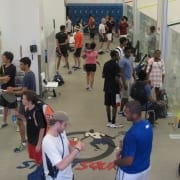“What is the kingdom of God like? And to what should I compare it? It is like the mustard seed that someone took and sowed in the garden; it grew and became a tree, and the birds of the air made nests in its branches”
— Luke [13:18]–19
THE MUSTARD SEED AND OUR DREAMS WITH OUR CAREERS
Many times our dreams exceed our capabilities and credentials. We find ourselves competing in places we know little about or with people who have résumés far superior to our own. How do we succeed? How do we rise above our limitations? The answer is simple; by believing in ourselves and by working harder and doing those things others won’t do.
Every interview ended with “You don’t have enough experience.”
One of my clients, Carolina, wanted to work in a very large professional firm in NYC. Every interview ended with “You don’t have enough experience.” While she had gone to a great school and gotten great grades, they were a little shy of what would get her in the door. Finally, she accepted an internship with a large professional firm, with the knowledge that she had less than a 20 percent chance of being hired.
She still had six weeks until the internship started. She wanted to give herself the best chance of earning a full time position, so she took the time to simulate her new job by taking self-directed courses that would improve her skills. She spent hours making sure she knew every answer to every question imaginable. She would study complicated legal documents until she understood them completely.
The other interns took the time off, and Carolina was constantly fighting the temptation to do the same, but she knew her dream. She worked hard and dug into issues she didn’t understand. She wanted to be able to start the first day ready to go.
“Using the image of the mustard seed, Jesus tells us that little things can have a big impact in achieving our dreams.”
In talking about the mustard seed, Jesus compares it to the Kingdom of God, how from a little thing, the smallest of all seeds, a great tree would emerge. Using the image of the mustard seed, Jesus tells us that little things can have a big impact in achieving our dreams. Little things like extra effort. Sure, the other person has more experience, and sure, the other person has a better résumé. But hard work that is focused on our dreams is like the mustard seed. It always grows.
“Hard work is the one defining thing that separates excellence from what is merely good.”
Hard work is the one defining thing that separates excellence from what is merely good. It is the one intangible we can control. We know our dreams, and they can be lofty. But being willing to do a little more can create a mighty career.
“The mustard seed of working hard allowed her to achieve her dreams.”
We know the end of this story well. It plays out in the movies all the time. The good person struggles, tries hard, and succeeds. It’s the journey of life and of the Kingdom of God. Carolina did get her job and excelled at it. The mustard seed of working hard allowed her to achieve her dreams.
Blessings, until next time,
Bruce L. Hartman
PARTING THOUGHTS
What are our dreams?
What stands in our way?
How do we overcome obstacles?
How is this like the Kingdom of God?










